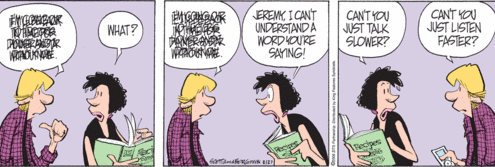The Preacher’s Voice Can Be A Big Drawback
The Preacher’s Voice Can Be A Big Drawback
In the last several posts we have been considering Albert Mehrabian’s 7-38-55 theory of communication. Recall that the conclusion of his research led him to propose that 7 percent of communication is the words we use; 38% is the tone of our voice; and 55% is body language. Previous posts have discussed the issues of body language, so in this post we turn to a consideration of the voice. The preacher’s voice can be a big drawback in our preaching.
Negative Talking Problems
The tone, quality and pitch of voice is a big part of how we communicate. My major point in this post is that the preacher’s voice can be a big drawback to our presentation on Sunday. It can be a big asset, for sure. But often the voice, 38% of our communication, provides big distractions. How? Here are some ways.
Preaching Too Fast
 It’s normal, especially for people who don’t preach often, to get nervous and speak too rapidly. I remember the time my father heard me preach for the first and only time. He worked in a factory most of his adult life, and as a result, had difficulty hearing, in spite of hearing aids. As you can imagine, I was eager to receive his approval, but that didn’t happen. Why? Because I spoke too fast, and he couldn’t process the pace of my preaching. This is an extremely common problem for preachers.
It’s normal, especially for people who don’t preach often, to get nervous and speak too rapidly. I remember the time my father heard me preach for the first and only time. He worked in a factory most of his adult life, and as a result, had difficulty hearing, in spite of hearing aids. As you can imagine, I was eager to receive his approval, but that didn’t happen. Why? Because I spoke too fast, and he couldn’t process the pace of my preaching. This is an extremely common problem for preachers.
The “Preaching Voice”
When I was a kid, we had a preacher that my parents said had a “preaching voice”. They used the Dutch phrase from  their childhood that explained that some preachers used a fake voice when they preached. I heard it referred to as “talking like he had a steeple stuck in his throat”. His voice was deeper, and seemed to convey that what he was saying was more important when he was preaching rather than when he was just having a conversation with you.
their childhood that explained that some preachers used a fake voice when they preached. I heard it referred to as “talking like he had a steeple stuck in his throat”. His voice was deeper, and seemed to convey that what he was saying was more important when he was preaching rather than when he was just having a conversation with you.
This might have worked well for some preachers back then, but it won’t work today, at least not in my culture. Today the younger generation in my country prefers a conversational style.
Too Soft
Enough said. If they can’t hear you, your sermon won’t make any impact, except for people going away asking “What did he say?”
Too Loud
If they hear too much, they won’t remember the message. People get irritated at a pastor who shouts all the time.
Irritating Habits
 Today on the radio I heard an actress who was asked about a scene in a recent broadway play. In the scene she gasped just as the curtain was coming down for intermission. The interviewer asked her what she was causing the gasp. She said, “It was, like, amazing! Like each time, it was, like something new. Sometimes, it was, like, fear. Other times it was, like, horror. Like, it was something different every time.”
Today on the radio I heard an actress who was asked about a scene in a recent broadway play. In the scene she gasped just as the curtain was coming down for intermission. The interviewer asked her what she was causing the gasp. She said, “It was, like, amazing! Like each time, it was, like something new. Sometimes, it was, like, fear. Other times it was, like, horror. Like, it was something different every time.”
I’m not kidding. She used “like” so many times I couldn’t hear anything else she was saying. Do you do that? Maybe your irritating repeated word is “um”. That’s one I hear quite frequently. This is, um, the greatest story, um, ever told. It drives me crazy.
It is important to listen to yourself speak, and see if you have any of these habits, or ask someone you trust to tell you the truth.
Dropping At The End Of Sentences
I’m going to include one more in this hall of shame for speaking. I include this one because it is a bad habit of mine. It’s dropping volume down at the end of sentences. I know I had this one, because my wife told me. She did it in a loving way, of that I can assure you, but she realized that this was happening when someone asked her what I had said at the end of a sentence in my sermon. So, for awhile, I practiced my sermons, knowing that this was a problem.
Okay, these are some big issues; ones that can make you believe that the preacher’s voice can be a big drawback to effective communication. The next time we will consider how to make your voice a huge asset in communicating the wonders of the Bible.
In the meantime, here is a profession speech coach talking about how to solve speech that is too fast for the public.



